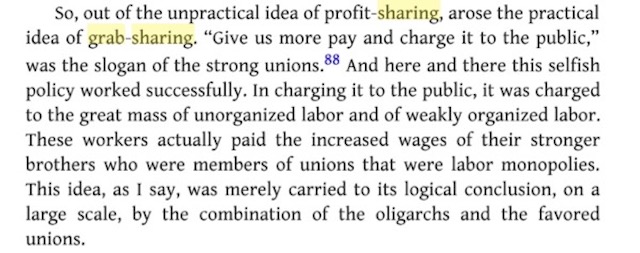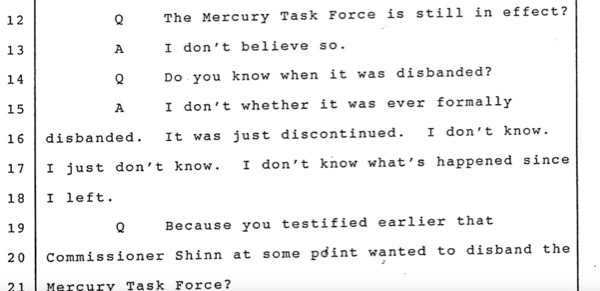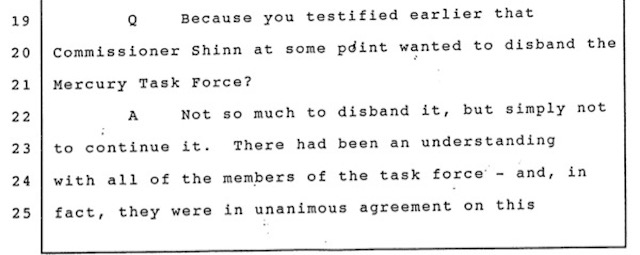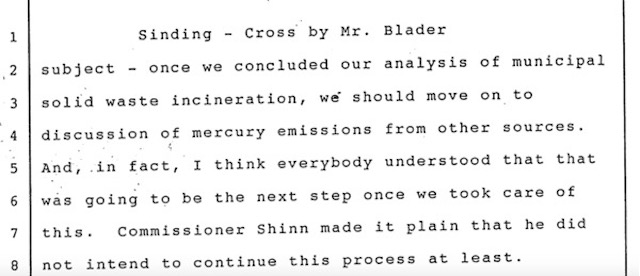This is what deep corporate lobbying and propaganda look like
Climate crisis can be solved by markets, technology, consumers & experts
No need for government, regulations, citizens & democratic activism
[Update below]
Intro Note: The writer Jack London, in his classic 1905 book “The Iron Heel”, criticized the concept of “grab sharing”, where selfish unions cut sweet deals with the Oligarchs and sold out their working class brothers and fellow unions. Here’s an excerpt where London describes that:
 Tom Gilbert and Rethink NJ are engaged in good old fashion selfish “grab sharing”. ~~~ End Intro
Tom Gilbert and Rethink NJ are engaged in good old fashion selfish “grab sharing”. ~~~ End Intro
Several times, and for a variety of reasons, I have criticized Tom Gilbert and the folks at Rethink Energy NJ.
I’ve questioned their strategy: i.e. a focus and emphasis on FERC, economics, and private property rights, while ignoring DEP, the Clean Water Act regulatory framework, and climate change.
I’ve questioned their lame tactics, reliance on corporate consultants and corporate lawyers, and attempts to marginalized or co-opt real grassroots activists.
I’ve even questioned Tom Gilbert’s competence, style, experience, qualifications, and leadership abilities. (I forgot to add that he’s a liar as well).
And I’ve linked all that to their corporate foundation Funders (Dodge, Chris Daggett) and self serving relationships with what I call NJ’s “Green Mafia” (a network of self dealers and opportunists, led by Mike Catania at Duke Foundation, Eric Stiles of NJ Audubon, Tim Dillingham of American Littoral Society, and Ed Potosnak of NJLCV).
Reasonable people can disagree about all that, of course.
But given the latest Rethink/Gilbert escapade, I am sickened by the fact that these are no longer just reasonable disagreements between reasonable people over strategy and tactics.
Let me be very clear: Rethink NJ is not just an ineffective, innocent and misguided group, pursuing flawed tactics and strategy and led by weak leadership and corporate lawyers, consultants, and Foundation funders.
They are active saboteurs of the most important climate campaign in NJ history.
Follow the sequence here:
1. On February 15, 2019, Jeff Tittel of NJ Sierra Club authored an Op-Ed in the Bergen Record on behalf of the “Empower NJ” campaign, see:
As a result of accelerating climate change and the probability of irreversible runaway climate catastrophe, Empower NJ is demanding that NJ Gov. Murphy (D) impose a statewide moratorium on new fossil infrastructure until plans and regulations with teeth are adopted to address climate change and the greenhouse gas emission reduction mandates of the NJ Global Warming Response Act.
Sierra Club is a longstanding leading Statewide group, a founding member of the Empower NJ Coalition, and Tittel often is quoted by and given Op-Ed opportunities in the Bergen Record.
The Bergen Record has covered the huge controversy over a proposed new gas plant and pipelines in the Meadowlands that Tittel focused on.
So, Record readers and the news and editorial sides of the Record are familiar with and invested in the issues discussed in Tittel’s Op-Ed.
These are the typical factors involved in editorial decisions about publishing Op-Ed’s, e.g. what controversial issues to cover and what groups and writers to publish. There was nothing unusual in Tittel’s Op-Ed publication, from the Record’s journalistic perspective.
2. Just 5 days later, on February 20, 2019, Tom Gilbert of Rethink NJ published a topically related but vastly different Op-Ed in the Record, see:
Gilbert and Rethink NJ are not members of the Empower NJ Coalition, are recently founded and not a recognized statewide group, and they are focused almost exclusively on the PennEast pipeline in Hunterdon and Mercer counties.
The PennEast pipeline is outside the north jersey coverage region of the Bergen Record. The Record has not covered the PennEast controversy and never quoted or given Tom Gilbert an Op-Ed opportunity (at least that I am aware of).
So, aside from Tittel’s 5 day prior related Op-Ed, it is highly unusual for the Record to be giving Gilbert an OP-Ed opportunity on a project and controversy that they haven’t even covered and purportedly written by an author and a group completely unfamiliar to Bergen Record readers.
When you consider the fact that the record published an Op-Ed on a related topic just 5 days prior, it is beyond highly unusual editorial practice and evidence of bad faith.
At a minimum, the Gilbert Rethink Op-Ed was an attack on and rebuttal of Tittel’s prior Op-Ed.
3. Most importantly, Tittel’s Op-Ed stressed 3 things:
- accelerating climate crisis
- a need for a moratorium and enforceable regulation to meet science based & legally mandated reductions
- call for activism with a focus on political pressure on Gov. Murphy
In contrast, Gilbert’s message completely failed to even mention an accelerating climate crisis, or the need for a moratorium and strict regulations to meet the legislative mandates of NJ’s Global Warming Response Act, or for citizens to put political pressure on Gov. Murphy to impose a moratorium, as other Governors have.
Instead, Gilbert, by omission, downplayed the climate urgency, while he praised Gov. Murphy, and promoted markets and technological innovation to provide solutions, instead of government regulation and political activism. (no wonder Rethink just praised Sen. Booker – let’s not forget what Booker has done for PSEG).
Here is Gilbert’s essential message – there is no need for politics and regulation, just trust markets, technology, and experts:
There comes a time when it’s clear that the next phase of technology is a vast improvement over what came before – no matter how useful that outmoded technology once was.
Typewriters worked fine, but PCs are so much better.
Natural gas is about to become the next typewriter. There are now cleaner, safer, more affordable ways to heat, cool, and power New Jersey, like wind and solar, that far surpass what gas has to offer.
Gilbert says “there comes a time“? Is that some kind of lame attempt to echo Mario Savio’s immortal cry:
There is a time when the operation of the machine becomes so odious, makes you so sick at heart, that you can’t take part. You can’t even passively take part! And you’ve got to put your bodies upon the gears and upon the wheels, upon the levers, upon all the apparatus, and you’ve got to make it stop! And you’ve got to indicate to the people who run it, to the people who own it — that unless you’re free, the machine will be prevented from working at all!
Of course, Gilbert is no Savio and is full of bullshit. But more importantly, his message is completely compatible with the strategic objectives and corporate profits of PSEG.
4. All of which takes us to the question of bad faith and active sabotage.
The highly unusual timing and editorial decisions by the Bergen Record are strongly suggestive of bad faith, but not determinative, or a smoking gun.
Here is the smoking gun:
Rethink NJ pays for a consulting firm for communication services, including drafting Op-Eds and working behind the scenes to get them published (it is not easy to get an Op-Ed published, and as noted above, Tom Gilbert meets NONE of the traditional qualifying tests for an Op-Ed opportunity).
That consulting firm is Taft Communications.
If you hit the link on “Client List”, you can see Rethink Energy NJ listed as a client.
But if you also look slightly above Rethink, you will see that PSEG is also a Taft client.
At best, that is a conflict of interest.
But, given that: a) I know Tom Gilbert and have questioned his competence – could he even draft an Op-Ed? – and b) the highly unusual Bergen Record editorial publishing decisions, AND c) the Taft linkage, it is not a huge leap to conclude that Taft drafted the Op-Ed, marketed it with national USA Today editors (over the head of the Bergen Record editors who know the local scene) and that Taft’s PSEG’s client interests were “harmonized” with the message of the Op-Ed.
I would even speculate that PSEG – who strongly opposes the moratorium Tittel and Empower NJ are calling for and has longtime relationships and has provided financial support to the Rethink crowd – had a role in either urging Taft or Gilbert to draft the Op-Ed and the USA Today editors to publish it.
It is even possible that PSEG corporate flacks actually drafted the Op-Ed and sent it over the transom to Taft or Gilbert.
That, my friends, is sabotage.
And exactly what deep corporate lobbying and propaganda look like.
[Full disclosure: I worked with NJ Sierra Club from 1995 – 2001, including several of those years with Jeff Tittel. I also was hired by and worked with Tim Dillingham when he was Sierra Director, around 1995]
[Update – 2/24/19 – just came across the piece, from The Nation, which makes a similar point:
While it’s not well-known outside the political class, many consultants who advise campaigns are often working for corporate clients at the same time—and all too frequently, these clients interests’ directly oppose the goals of any progressive coalition.Those working both sides of the street include some of the most senior aides from the Obama administration, and as well as advisers to both the Clinton and Sanders campaigns. From opposing progressive taxation to fighting for deregulation, working for corporate clients means pushing an agenda most progressives would consider a non-starter were it espoused by a political candidate.
And this is exactly what I suspect Taft Communications did in drafting Gilbert’s Op-Ed:
Solutions daring enough to solve the problems we face, like a Green New Deal, aren’t necessarily going to be “business-friendly,” and may not be endorsed by corporate America. Some consultants may—consciously or unconsciously—advise their candidates to take a softer stance on an issue because they can “see it from the business side of things.”





